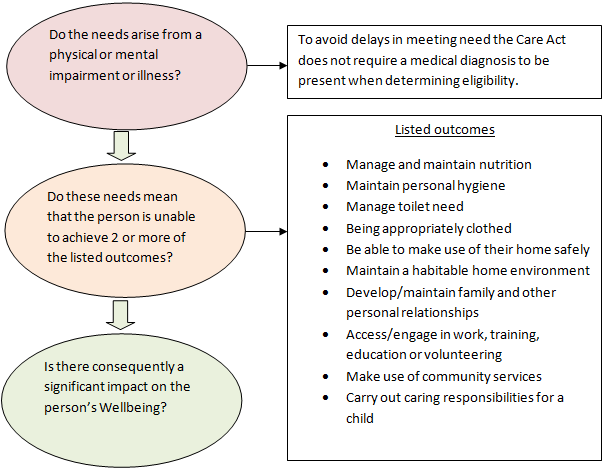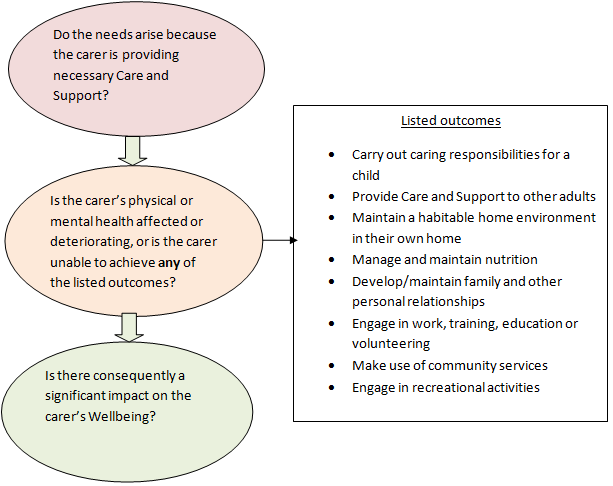The National Eligibility Criteria
Amendment
In March 2024, Section 1, What is the National Eligibility Criteria was updated to include information from the Care and Support statutory guidance about establishing whether the person's needs arise from a physical or mental impairment or illness.
The National Eligibility Criteria is a single framework for determining whether any assessed Care and Support needs (or, in the case of carers any Support needs) meet the threshold for support from the Local Authority.
The National Eligibility Criteria is set out in section 13 of the Care Act. Whenever a document or person refers to section 13 of the Care Act they are referring to the National Eligibility Criteria, even if they do not specifically use that phrase.
It is important to note that the National Eligibility Criteria is used only to determine whether a person's (or carer's) assessed needs are eligible for support from the Local Authority. It is not a determination about suitability for a particular service provision or even about what nature of support the Local Authority should or should not provide to meet the need.
The National Eligibility Criteria is 'National' because there are no local variations to its application or interpretation. This means that regardless of where a person or carer lives the same eligibility criteria is applied in the same way, achieving consistent outcomes. When people choose to move from one Local Authority area to another, this makes it easier because unless their needs have changed they should be supported by the new Authority in a similar way to the way they have been used to.
There are 2 National Eligibility Frameworks, one for people with Care and Support needs and one for carers with Support Needs. They both work in the same way and consist of 3 questions, each of which must be answered 'Yes' in order to determine which, if any of the person's needs are eligible.

The care and support statutory guidance defines physical or mental impairment or illness as either physical, mental, sensory, learning or cognitive disabilities or illness, substance misuse or brain injury.
The relevant national eligibility criteria should be applied against the information gathered during assessment in order to determine which (if any) of the person or carers needs are eligible needs under the Care Act. Under s. 18, the Local Authority has a duty to meet eligible needs. It may also choose to meet other needs under s. 19 but is not required to do so.
For each need the person has in the areas listed in the relevant framework a judgement must be made by the Local Authority as to whether the person or carer is able to achieve that need and if not, whether not being able to do so has a significant impact on their Wellbeing.
Under the Care Act a person or carer is deemed 'unable to achieve' a listed outcome if they are:
- Unable to achieve it without assistance;
- Able to achieve it without assistance but doing so causes them significant pain, distress or anxiety (this is a determination made using professional judgement);
- Able to achieve it without assistance but doing so endangers or is likely to endanger the health and safety of the person or others; or
- Able to achieve it without assistance but takes significantly longer than would normally be expected (this is a determination made using professional judgement).
Significant impact on the Wellbeing of the person or carer can mean:
- A single impact on a single area of Wellbeing that is seen as significant; or
- A cumulative effect, where several areas of Wellbeing are impacted significantly or where the overall impact is significant.
In some cases, the impact on Wellbeing may not yet be significant, but ongoing instability in the situation means that the impact on Wellbeing is likely to become significant in the near future if support is not provided.
Where the level of a person's needs fluctuates, in determining whether their needs meet the eligibility criteria, the Local Authority must take into account their circumstances over such period as it considers necessary to establish accurately their level of needs. This means that judgements about eligibility should not be normally made on either a 'worse case' or 'best case' scenario.
Where the level of a carer's needs fluctuates, in determining whether their needs meet the eligibility criteria, the Local Authority must take into account their circumstances over such period as it considers necessary to establish accurately the carer's level of need.
Only when the Local Authority is satisfied on the basis of a needs assessment (or carers assessment) that a person has needs for Care and Support (or that a carer has needs for Support), should it determine whether any of the needs meet the National Eligibility Criteria. This means that the eligibility criteria cannot lawfully be applied before an assessment has been completed.

Having made a determination, the Care Act requires that in all cases the Local Authority must give the person or carer concerned a written record of the determination and the reasons for it.
Under the Care Act the final decision on eligibility rests with the Local Authority.
Where none of the person's assessed needs meet the eligibility criteria, the Local Authority must give them written advice and information about:
- What can be done to meet or reduce the needs; and
- What can be done to prevent or delay the development of needs for Care and Support, (or, in the case of carers the development of needs for Support), in the future.
Where at least some of a person's needs for Care and Support meet the eligibility criteria, the Local Authority must:
- Ascertain whether the person wants to have those needs met by the Local Authority;
- Consider what could be done to meet those needs; and
- Establish whether the person is ordinarily resident in the Local Authority area (if not already known).
Where at least some of a carer's needs for Support meet the eligibility criteria, the Local Authority must:
- Consider what could be done to meet those needs; and
- Establish whether the person needing care is ordinarily resident in the Local Authority area (if not already known).
Last Updated: February 12, 2024
v27
